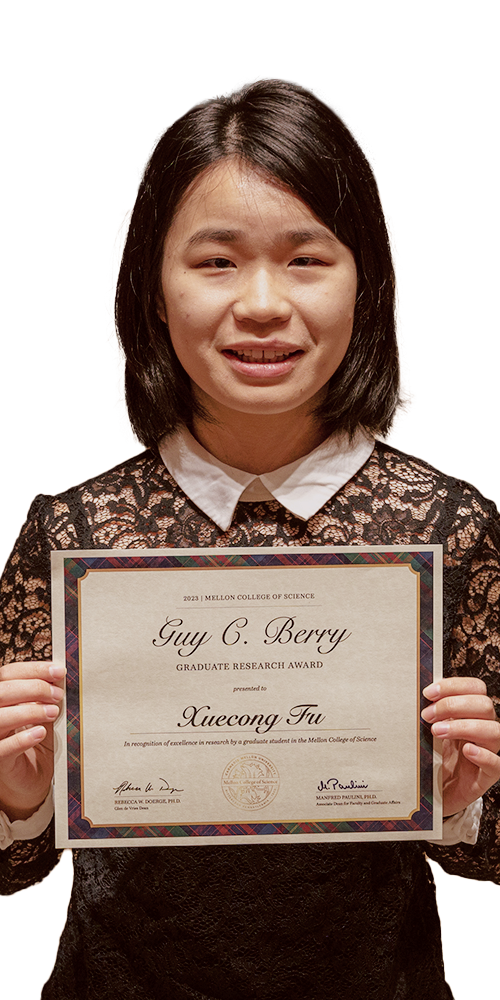Student Stories
Student Awards

CHIANG WINS 2023 K&L GATES PRIZE
When it comes to animals and research, Claire Chiang gives a hoot.
“When I imagined my future, I was solely veterinary, like I was going to work in a clinic with dogs and cats and have a great time,” said Chiang, who graduated with a bachelor’s degree in biological sciences and a minor in environmental and sustainability studies. “After doing research, I realized I really enjoyed it. I’m starting to think about seeing myself as a veterinarian who pursues research.”
One of the places where Chiang has cared and studied animals is Pittsburgh’s National Aviary, where she worked as a veterinary hospital intern and helped a myriad of patients from egrets to crowned pigeons to penguins.
Chiang found ways to connect her passion for veterinary medicine with her dedication to developmental biology.
Chiang formed an interest in developmental biology research through taking Honors Modern Biology with Jonathan Minden, professor of biological sciences. Afterward, worked with Minden to investigate the molecular mechanisms that occur as fruit flies, Drosophilia, develop as embryos.
Chiang also did research at the University of Pittsburgh with Kevin Kohl, where she investigated digestive enzymes in rodents. She served as a supplemental instructor, a teaching assistant, the president of CMU Sustainable Earth and a member of Carnegie Mellon’s Health Professions Program.
Because of her hard work in and out of the classroom, Chiang was honored with Carnegie Mellon’s K&L Gates Prize. The $5,000 award is given to one graduating student every year.
This fall, Chiang will attend Cornell University College of Veterinary Medicine as she pursues a doctor of veterinary medicine.
■ Kirsten Heuring

HSU EARNS BIOLOGICAL SCIENCES FELLOWSHIP
Doctoral candidate Alex Hsu was awarded the Glen de Vries Fellowship for the Biological Sciences for his research using computational methods to analyze neuroscience data.
“It has always been my plan to learn how to analyze big data better and establish where machine learning can benefit neuroscientists,” Hsu said. “I wanted to learn how to analyze big data with machine learning.”
As part of the Yttri lab, Hsu created software to process large behavioral data to find correlations in neuroscience data. He records multiple points of data from mice. The data is fed into a computer application he created, which determines which neural impulses cause which movements.
Hsu and Yttri want to apply their research to Parkinson’s disease patients. By recognizing what impulses cause which movements, they could find a way to target and limit those impulses.
“If we understand that a certain brain circuit has gone awry for whatever reason during a proposed movement, we can use our software to selectively stimulate when the action is detected,” Hsu said.
Hsu shares the program with other labs across the country. The program can be used to study other neurological conditions, such as chronic pain and OCD.
■ Kirsten Heuring

FU HONORED WITH BERRY GRADUATE RESEARCH AWARD
Xuecong Fu computes new ways to understand and treat cancer.
“I really like developing new algorithms that fit different applications,” said Fu, a Ph.D. student. “Since current biological technology is evolving fast, computational tools also need to evolve.”
Fu’s work is gaining recognition. She received the Mellon College of Science’s Guy C. Berry Graduate Research Award, which honors excellence in research by Ph.D. students.
Fu developed computational methods and algorithms to understand how tumors progress. Her machine learning algorithms determine how cell populations grow and change during tumor progression. Her tools also process mutation histories from individual patients and compare them to genetic trees of tumors.
Fu’s current work uses liquid biopsy samples, a new technology that extracts tumor DNA fragments from blood in a less intrusive way. Fu is building a computational tool to identify biological markers to measure patients’ subclonal cell populations and better identify the tumor evolutionary history of a specific patient.
“I’m hoping that we are able to find significant results in patients’ subclonal population changes after surgery or chemotherapy by using those biomarkers,” Fu said. “I think these findings can help guide treatment for specific patients.”
■ Kirsten Heuring